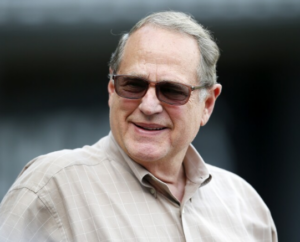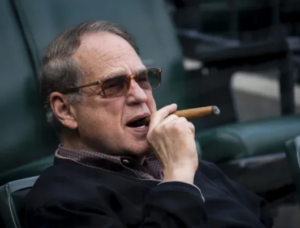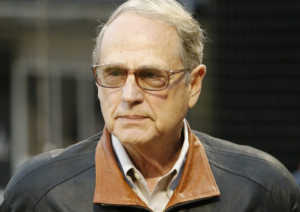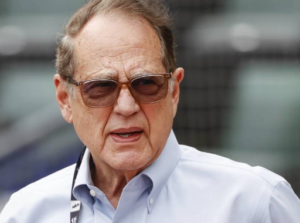Mad Dog Russo Calls Out Jerry Reinsdorf, Holds Him Responsible for White Sox’s Struggles
#Mad #Dog #Russo #Calls #Jerry #Reinsdorf #Holds #Responsible #White #Soxs #Struggles
Welcome to Allsocial Updates . Get latest News related to entertainment, Education, Technology, Sports, Science , Finance at one place. Please Subscribe to our feed and Bookmark our website for all updates around the world
Chris ‘Mad Dog’ Russo’s Strong Criticism of White Sox Management
Chris ‘Mad Dog’ Russo, a well-known and outspoken sports analyst, did not hold back in expressing his displeasure over the Chicago White Sox’s decision to dismiss manager Pedro Grifol.
The move to replace Grifol with Grady Sizemore as the interim manager has sparked various opinions, but Russo’s reaction has drawn significant attention for its sharp criticism, particularly directed at White Sox owner Jerry Reinsdorf.
Russo’s Critique of Reinsdorf’s Leadership
Russo’s primary contention lies not with the decision to fire Grifol but with the underlying issues he believes stem from the top—specifically, the ownership. Russo argues that the real problem behind the White Sox’s disappointing season isn’t the managerial staff but the ownership, particularly pointing the finger at Jerry Reinsdorf.
According to Russo, Reinsdorf’s leadership, or lack thereof, is responsible for the team’s disastrous season, one of the worst in the franchise’s history.
Comparing the Bulls’ Success to the White Sox’s Struggles
Russo’s argument gains weight when comparing the success of the Chicago Bulls during their championship years to the ongoing struggles of the Chicago White Sox.
He highlighted that while the Bulls were able to achieve greatness due to Jordan’s exceptional talent and leadership, the White Sox have languished under Reinsdorf’s ownership, suffering through one of their worst seasons in decades.
The Impact of Ownership on Team Performance
Ownership in sports can often be a double-edged sword. While owners are typically not involved in the day-to-day operations or tactical decisions, their influence on the culture, resources, and long-term vision of the franchise is undeniable.
Russo’s critique of Reinsdorf touches on a broader issue in professional sports: the impact of ownership on a team’s success or failure.
Grady Sizemore’s Interim Role and Future Outlook
With Grady Sizemore stepping in as the interim manager, the White Sox are entering a transitional phase.
While Sizemore’s appointment may bring a temporary change in leadership, Russo’s comments suggest that the issues plaguing the White Sox may not be resolved without addressing the larger structural and leadership concerns.
Also Read: Jose Mourinho Aims for Fenerbahce to Sign Barcelona Star, Transfer News and More
White Sox GM Discusses Future Plans and Jerry Reinsdorf’s Vision for the Offseason
The 2024 season was one to forget for the Chicago White Sox. They ended with a dismal 28-89 record, including a staggering 21-game losing streak that tied for the most in American League history.


The disastrous season had far-reaching consequences, one of the most significant being the departure of manager Pedro Grifol, who was let go after just his second year with the team. As the White Sox organization begins to pick up the pieces, there is a glimmer of hope in the form of new plans and strategies for the upcoming offseason.
Chris Getz’s Vision for the White Sox
Chris Getz, the White Sox’s general manager, is stepping into a crucial role as the team looks to turn things around. In a recent interview, Getz provided insight into the team’s plans moving forward, emphasizing a new strategic direction under the guidance of team owner Jerry Reinsdorf.
Jerry Reinsdorf’s Offseason Strategy
Jerry Reinsdorf, the long-time owner of the White Sox, has long been a figure of stability and tradition in the franchise. His approach to team-building has often been characterized by a cautious fiscal strategy.
Historically, the White Sox have not been known for making splashy moves in free agency, and their spending has rarely breached the $100 million mark in any given season. This contrasts sharply with other franchises like the Los Angeles Dodgers, who are renowned for their aggressive spending and multi-billion dollar investments during the offseason.
The Financial Landscape of the White Sox
- Historically, the White Sox’s spending habits have reflected a more conservative approach compared to their wealthier counterparts.
- For instance, while the Dodgers routinely invest in high-profile free agents and make major financial commitments, the White Sox have been more restrained.
- This has led to occasional criticism from fans and analysts who argue that the team’s limited spending contributes to its competitive struggles.
- In recent years, the White Sox have made some notable moves, but they have generally avoided the kind of extravagant spending seen with teams like the Dodgers.
- This has often been viewed as a strategic choice to manage financial risk and maintain flexibility. Yet, the disappointing 2024 season has prompted a reevaluation of this strategy.


Jerry Reinsdorf: A Legacy of Ownership and Business Acumen
Jerry Reinsdorf was born on February 25, 1936, in Brooklyn, New York. Growing up in a bustling urban environment, Reinsdorf’s early life was shaped by the diverse and dynamic world of New York City.
He pursued higher education at the prestigious Northwestern University, where he earned a degree in law. This legal background would later play a significant role in his business ventures and management style.
Why Jerry Reinsdorf and the Bulls reportedly declined a top-10 draft pick for Alex Caruso pic.twitter.com/OWw9wmAdJt
— For The Win (@ForTheWin) June 17, 2024
Career Beginnings
Reinsdorf’s career began in the legal field, where he practiced law for several years. His expertise in legal matters laid a solid foundation for his future endeavors in sports and business.


In the 1970s, Reinsdorf transitioned into the business world, focusing on real estate and investment opportunities. His knack for identifying and capitalizing on lucrative ventures became apparent during this period.
Acquisition of the Chicago White Sox and Chicago Bulls
- Reinsdorf’s foray into sports ownership began in 1981 when he acquired the Chicago White Sox. The purchase was a strategic move that would shape the future of the team and Reinsdorf’s legacy in professional sports.
- Under his ownership, the White Sox experienced a resurgence, including winning the World Series in 2005.
- A few years later, in 1985, Reinsdorf expanded his sports empire by purchasing the Chicago Bulls. This acquisition marked the beginning of a new era for the Bulls, who, under Reinsdorf’s stewardship, would go on to achieve significant success.
- The Bulls became one of the most dominant teams in NBA history, largely due to the leadership of Reinsdorf and the management team he assembled.
Impact on the Chicago Bulls
Reinsdorf’s tenure as majority owner of the Bulls is marked by unparalleled success. During the 1990s, the team, led by Michael Jordan and coach Phil Jackson, won six NBA championships.
Reinsdorf’s ability to create a winning environment, support key players, and foster strong management practices contributed significantly to this success. His commitment to building a championship-caliber team and his investment in player talent and development were crucial factors in the Bulls’ dominance during this period.
Also Read: Shocking NHL News: Evgeny Kuznetsov Explains Sudden Departure
Early Business Career of Jerry Reinsdorf
Jerry Reinsdorf’s career began in the realm of law after he graduated from Northwestern University in 1960. His initial role was as an IRS lawyer, where he tackled a variety of tax-related issues. One of his early and notable cases involved Bill Veeck, the then-owner of the Chicago White Sox.
Veeck, a prominent figure in baseball known for his innovative and often flamboyant approach to the sport, faced tax delinquency issues at the time. Reinsdorf’s work on this case marked an early intersection with the world of professional sports, setting the stage for his future involvement in the industry.
Transition to Private Practice
In 1964, Reinsdorf transitioned from his role with the IRS to private legal practice. This move allowed him to broaden his scope and apply his legal expertise in various business contexts. His work in private practice involved a range of legal issues, including corporate law, real estate, and investment matters.
This period of his career was characterized by a focus on building a successful legal practice and developing a strong reputation within the business community.


Business Ventures and Investments
During his time in private practice, Reinsdorf began exploring opportunities beyond the legal field. His involvement in real estate and investments provided him with a foundation for future business endeavors.
This phase of his career was marked by a growing interest in business management and ownership, paving the way for his eventual ventures into the sports industry.
Impact of Early Career on Future Success
Reinsdorf’s early career in law and business played a crucial role in shaping his approach to ownership and management. His experience dealing with complex tax issues and his work in private practice equipped him with valuable skills in negotiation, strategic planning, and financial management.
These skills would later become instrumental in his successful acquisition and management of the Chicago White Sox and Chicago Bulls.
Jerry Reinsdorf’s Net Worth: An In-Depth Look at the Wealth Behind the Sports Mogul
Jerry Reinsdorf, a prominent figure in both the legal and sports worlds, boasts a net worth estimated at $2 billion. Known for his roles as a lawyer, CPA, and owner of two major sports franchises—the Chicago White Sox and the Chicago Bulls—Reinsdorf’s wealth is a testament to his successful ventures and strategic acumen.
This detailed exploration delves into the sources of his wealth, his career milestones, and the impact of his financial achievements.
Early Career and Financial Foundations
- Jerry Reinsdorf’s journey to becoming a billionaire began with his education and early career. Graduating from Northwestern University in 1960 with a law degree, Reinsdorf initially worked as an IRS lawyer.
- His first notable case involved dealing with tax issues related to Bill Veeck, the then-owner of the Chicago White Sox.
- This early exposure to the world of professional sports, coupled with his legal expertise, laid the groundwork for his future success.
- In 1964, Reinsdorf transitioned to private practice, where he honed his skills in corporate law and real estate. His work during this period provided him with a solid financial foundation and experience in managing complex business transactions.
- These skills would later prove invaluable in his ventures into sports ownership and other business endeavors.


Sports Ownership and Financial Success
The cornerstone of Reinsdorf’s wealth is his ownership of the Chicago White Sox and the Chicago Bulls. Reinsdorf acquired the White Sox in 1981, marking the beginning of his significant influence in professional sports.
Under his ownership, the White Sox achieved notable success, culminating in their 2005 World Series victory. This triumph not only solidified Reinsdorf’s reputation but also contributed to the team’s increased valuation.
Investment Strategies and Real Estate Ventures
In addition to his sports holdings, Reinsdorf’s financial portfolio includes various investments in real estate and other business ventures. His background in law and finance provided him with the expertise needed to navigate complex investment opportunities.
Reinsdorf’s real estate investments have been particularly lucrative, contributing substantially to his wealth. His ability to identify and capitalize on profitable ventures has been a key factor in his financial success.
FAQ’S
1. Who is Mad Dog Russo?
Ans: Mad Dog Russo, whose real name is Christopher Russo, is a prominent sports talk radio host and television personality known for his outspoken commentary on various sports topics. He has worked on radio and television for several decades and is a well-known figure in sports media.
2. What did Mad Dog Russo say about Jerry Reinsdorf?
Ans: Mad Dog Russo criticized Jerry Reinsdorf, the owner of the Chicago White Sox, for the team’s ongoing struggles. Russo suggested that Reinsdorf’s management and decisions are significant factors contributing to the team’s poor performance and lack of success.
3. Why is Russo holding Jerry Reinsdorf responsible for the White Sox’s struggles?
Ans: Russo attributes the White Sox’s struggles to Reinsdorf’s management decisions, including choices related to team leadership, player acquisitions, and overall organizational direction. Russo believes that these decisions have negatively impacted the team’s performance and long-term success.
4. What specific issues with the White Sox has Russo highlighted?
Ans: Russo has pointed out issues such as inconsistent team performance, questionable managerial decisions, and perhaps a lack of investment in key areas. He argues that these issues stem from higher-level decisions made by Reinsdorf and his management team.
5. How has the public and media reacted to Russo’s comments?
Ans: The public and media reactions have been mixed. Some fans and analysts agree with Russo’s assessment, believing that ownership plays a crucial role in a team’s success.
Others might view Russo’s comments as an oversimplification or a way to shift blame away from other factors affecting the team’s performance. The discussion has sparked debate about the role of ownership in team management and success.
Read More: New York Phil Maton Trade News: Team Reportedly Acquires Outfielder Jesse Winker
